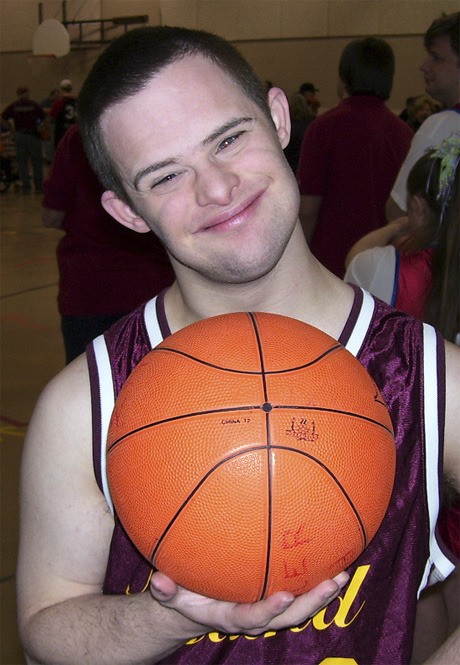Islander Brad Morse has a lot to smile about. He just won a basketball gold medal in Individual Skills at the Special Olympics Winter Games in Wenatchee on March 5. He qualified for state by taking a gold medal in the regional Special Olympics competition held in Issaquah on Feb. 7.
It took a number of attempts by the athlete, but this was his year, coach Bob Wells explained.
In Wenatchee, Morse, 18, took in every moment. He enjoyed marching with his team in the Opening Ceremonies, sharing a victory dinner with a few thousand athletes and coaches, and boogied his way through the Games Victory Dance. This was a big road trip away from home, and it was a huge success.
Morse wasn’t the only medal winner from Mercer Island at the Winter Games. Islanders earned a number of medals in skiing and snowboarding, as Island Special Olympics athletes achieve every year. Wells pointed out, however, that medals in basketball are much rarer. This year, by far, was the best yet for Island hoops athletes.
The Islanders team, playing in the Masters 5 Division, qualified for state and earned a hard-fought bronze medal at the Winter Games.
Another Island team, the Barracudas, playing in the Masters 7 Division, earned their first-ever gold in regional competition and took the bronze at state.
This year, only three Island hoop athletes did not qualify in skills, where regional gold is required for state.
The individual skills category is for those who are preparing for team participation. Morse’s friend, Gavin Halbett competed in skills last year and took a first-ever gold medal in the individual event. He played on the Barracudas team this year.
Morse is a student at Mercer Island High School. On most winter weekends he practices his ball handling and shooting skills at the North Mercer Gym with the Islanders Special Olympics basketball teams. Practices last two hours, with the first 40 minutes set aside for practicing together in drills and competitions. Those that need it get individual attention from the seven volunteer coaches. Then the athletes split into groups and focus on specific needs. Players might drill on a movement-based offense, pack-it-in zone, or blocking out, etc. The skills athletes work on their more basic maneuvers with individual coaching. Practices end with high energy scrimmages for each group, usually with coaches mixed in. Parents or friends who drop in often get recruited into the scrimmage keeping the mix interesting. The skills team “scrimmages” too, in the form of one of their disciplines with the benefit of everybody rooting for them, complete with a little friendly trash talking.
Special Olympics are a self-managed program run by the athlete’s parents. According to Wells, the program exists because of support for facilities from Mercer Island Parks Department and from St. Monica’s School for their soccer field. Donations from local service groups such as the Kiwanis Club provide gear, and Special Olympics athletes proudly wear maroon and white. Other sports and activities for the athletes include bowling, softball, golf and soccer. The Special Olympics skiing and boarding athletes work with the SkiHawks program.
Special Olympics are for athletes with intellectual disabilities and are open to athletes beginning at age 8. Island athletes’ ages range from about 10 to 48. Contact Special Olympics of Washington (SOWA) or the Mercer Island program at http://www.MISpecialOlympics.org.


